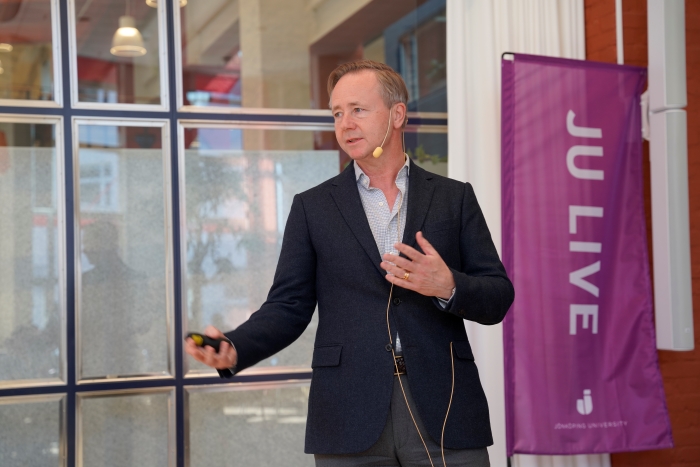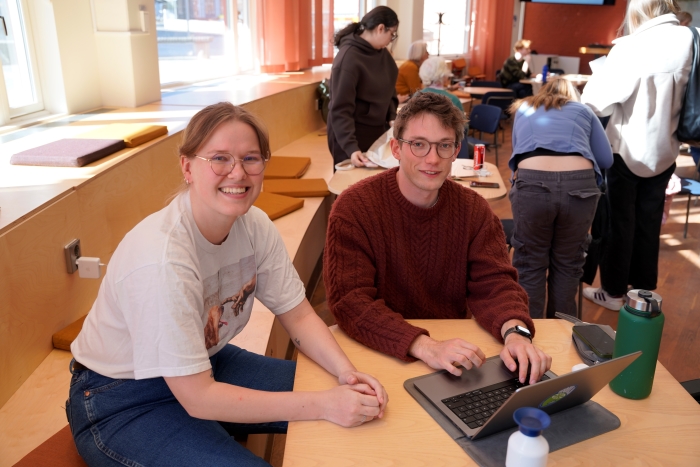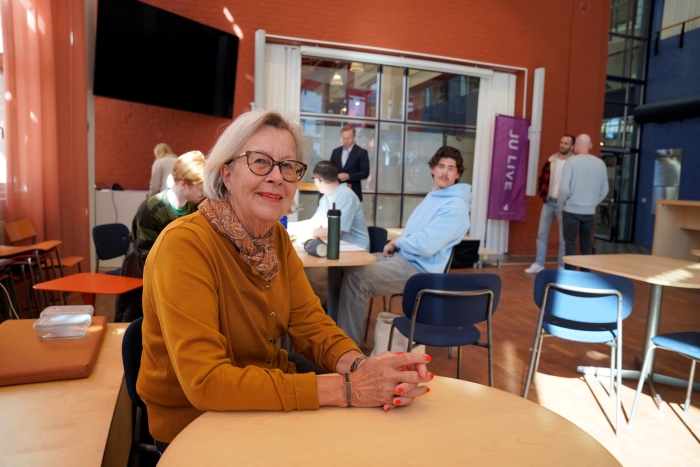JU LIVE - does visible consumption create better consumers?

Ulf Aagerup, Associate Professor at Jönköping International Business School, gave a lecture during the last JU LIVE of the spring term.
On Thursday 24 April, Ulf Aagerup, Associate Professor at Jönköping International Business School (JIBS) at Jönköping University (JU), gave a lecture during the last JU LIVE of the spring semester. The audience learned more about how people's desire to be seen in a positive light affects their consumption in both positive and negative ways.
“It is interesting and refreshing to get new perspectives from someone with long experience in research,” says visitor Florian Dick, who studies Global Management at JIBS.
The lecture series JU LIVE was started in autumn of 2023 and aims to give the public the opportunity to take part in exciting and relevant research that is ongoing at JU – free of charge. Ulf Aagerup's lecture was the last of four lectures held in the series during the spring semester.

Students Caroline Van Rijckevorsel and Florian Dick had come to listen to JU LIVE.
Do we make better choices if we think others see us?
During the lecture, Ulf Aagerup addressed various questions about how surveillance affects our behaviour in different ways, and whether we as consumers make more environmentally friendly choices and buy more ecological if we know that our choices are visible or registered somewhere.
Research shows that we change our behaviour if we think others see it and Ulf believes that it is possible to use this motivation for good.
“One thing we have looked at is environmentally friendly behaviour. If you ask people if they like organic products and a green lifestyle, most people say yes. If you then look at what is sold most, it is not organic products. There is a big gap between what people say and what they do," says Ulf Aagerup.
In one experiment, the researchers looked at students' choice of coffee. The students had to choose between buying regular coffee or organic coffee. It turned out that when they knew that it was visible which coffee they had bought, the majority chose the organic coffee. On the other hand, when the students knew that no one would see which coffee they bought, they chose the regular and cheaper coffee.
Social media affects us more than we think
A research experiment tested whether overweight people lost more weight when their results were shown on social media. 350 people took part in the experiment and participants were followed up weekly. One group was asked to post weekly on their social media accounts how much weight they had lost, while the other group was not. It was found that those who posted their weight on social media each week lost 20 per cent more weight than the group who did not post, and they were also more satisfied with their weight loss. However, they did not feel more satisfied with their lives despite achieving their goals, which also surprised the researchers.
Positive experience back in the autumn
Ulf thinks that the lecture was a positive experience.
“It's great that people outside academia are interested in our research. I see this as an important opportunity to reach out to a wider audience. It was also great that many people were engaged and asked questions," says Ulf Aagerup.
One of the visitors was pensioner Christina Werner, who took the opportunity to learn something new.
"I think Ulf's lecture made me think a lot about things that I might not think about in everyday life. It also gave me an insight into how much social media actually affects us, something I think many in my generation are not aware of. I would love to come back here more often," she says.
This was the last JU LIVE lecture for this spring, but more lectures will be held in the autumn when the JU LIVE lecture series returns in August.

Christina Werner, a retiree, found the lecture rewarding and thought-provoking.
